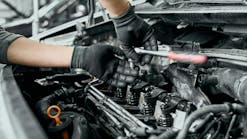A few weeks back I was at an automotive tool and equipment forum where I learned something that surprised me. It seems it can be far too easy to misidentify or incorrectly charge a vehicle’s battery. Batteries were never ‘one-size-fits-all’ and now with more electrification systems at play, technicians will be seeing more marked differences from one battery type to the next.
In North America, 12V batteries have long been the standard; but they’re not the only battery out there. Heavy duty and commercial will often use a 24V battery, while hybrid electric vehicles are beginning to integrate 48V (and higher) batteries. Most cars with Lithium-ion (Li-ION) also use lead-acid. A 48V battery has the ability to charge/discharge and keep everything running (think: vehicles with start-stop technology). The 48V, with lithium-ion Li-ION and lead acid AGM (absorbed glass mat), allows for better throughput and resistance.
Back in 2006 only a very small number of cars used Li-ION. In 2016 the piece of the pie got a little bigger: AGM batteries are used in Chevy Malibus, high-end vehicles with straight combustion engines and Jeeps. AGM batteries are more environmentally friendly; there’s no gassing, odor or free flowing electrolytes. This battery type will retain its charge longer, when a vehicle is not in drive for a period of time.
Director of Original Equipment at NorthStar Battery, Jeremy Cordray, says AGM batteries are slowly but surely taking hold. He predicts that in 2026 the number of AGM batteries will increase, but not in the amount needed to sustain vehicles with start-stop features.
Testing and charging
When a car, truck or SUV rolls into a maintenance facility needing its battery serviced or replaced, it’s not always a straightforward exchange. Many considerations and challenges lay ahead when it comes to electric vehicles and batteries, one of which is the need to more clearly mark battery types and document correct charging procedures.
Overall, batteries are poorly labeled. As such, OEs are beginning make improvements – specifically indicating “This is an AGM battery” and including clear charging voltages. You may notice more battery and vehicle manufactures calling out this information (for example, the typical charging range for AGM is 14.4V to 14.9V; the Li-ION range is 13.6V to 14.4V). If an AGM battery is charged at too high of a voltage, it can ruin the battery in less than one hour. It’s important to pay mind to proper charging.
Infrastructure is also something to keep in mind. Dedicated charging ports will be required for 48V Li-ION batteries coming down the line.
Have you encountered AGM batteries at your shop? It's never too early to begin envisioning, and preparing for, changes to today's connected cars.


